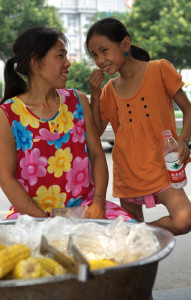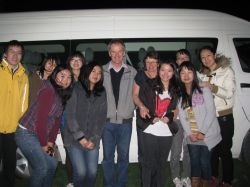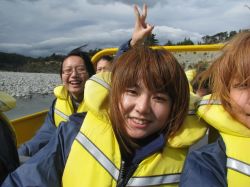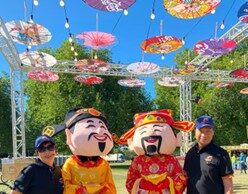September Newsletter PDF
Monthly Meetings
PLEASE NOTE: there is no September meeting
October Meeting
Speaker: John Gould
Rainwater Harvesting and Sustainable Rural Development in Gansu Province (details to come).
Branch News
- IMPORTANT NOTICE: there will be no meeting in September, as we are having the National Day banquet on 2 October – see banquet details in this newsletter.
- We are updating and checking the accuracy of our membership database at the moment, so you can expect a call from a committee member during the next couple of weeks.
HE MINGQING SCHOLARSHIP UPDATE (Diana Madgin)
With the annual National Day Banquet coming up (the proceeds of which go to the He Mingqing Scholarship), we thought it timely to give you an update on one of the scholarship success stories.
Kathleen Hall was a courageous and talented Kiwi missionary nurse who worked in the Taihang Mountains, southwest of Beijing, in the 1920s-30s. The local villagers called her He Mingqing; that’s the name of the scholarship set up by the NZCFS in February 2006. The scholarship pays annual the costs for a student from an impoverished family to train to be a nurse.
Our first two scholars, Wei Yunjie and Shen Qianqian, have graduated and have jobs. The HMQ committee’s idea was that the young nurses would graduate to work in their own villages, but we now know that this is not always possible. Jobs are hard to find, and graduates often don’t have much choice. Although we know each student to be a real Kathleen Hall star–altruistic and compassionate–we can only make this our wish, not our command.
I have a written correspondence with each young woman, but the scholarship has become more vibrant as Dave Bromwich has extended his work on NZCFS Projects to include setting up each new scholarship. If possible, he organises follow-up meetings, including with members of our Project Tours. Next month, Deborah Rhode of Christchurch Branch will be in Lanzhou with Dave to meet our third and fourth scholars, Shi Hongli and Wang Shuizhen. Here’s a recent letter from Shi Hongli, May 2011:
Sorry that I have not contacted you for some time. With your support, I have more confidence in my campus life.
For this new semester, I have more understanding about campus life. I have changed a lot from the first year to now. I was shy, lost and worried, but now I am more confident, positive and brave. All these changes are due to the help and support from you because I know there is a hope plus responsibility, which makes me move forward without hesitation.
We have some new courses this semester. We often go to hospital to have some internship so that we can have more understanding about what we are studying. Meanwhile, we have the chance to know some knowledge about equipments. We went to the Emergency department and Intensive Care Unit, knowing more about health care.
I used to have the idea that the health care covers only injection, changing pills and so on. However, I have a clear idea now that nursing is not just taking care of people. Instead, we need more basic theory and practical operation skills.
The hospital is the place where we will work in the future, where the patients are the important purpose of the work. What we need to do is from the patients’ perspective.
In the health care training room, we do some imitation operations. And then we do some real person operations. During this process, we suffer the patient’s pain while we know our position as a nurse. With the encouragement from my classmates, I have more confidence and courage.
I was deeply moved the moment when we succeeded in feeding patients by nose because of the co-operation from partners. I experienced the pain together with joy. Even if the injections make us have the feeling of real pain, we feel comfortable after our success.
The Nursing Festival is around the corner which is the second one for me. It is also an important festival for our college. Awarding of hats on that day marks the transition from an ordinary student to nurse. When former mates from our school pass the candle to us, we feel moved and have the sense of obligation too. We need to make some contribution to this society.
People consider nurses as angels. They praise nurses with nice songs. However, behind all is a kind heart. Health care is not that great. It is full of simple and ordinary love–injection, giving out pills, making beds and so on while we do shift work day and night.
I take pride in becoming a nurse soon. Nevertheless, I have more gratefulness and sense of duty in my heart. I have the same growth experience as others and I have the parents’ care, teachers’ training, the platform and support given by the hospital, with understanding from patients.
I need to say thanks to this job, which allows me to know how to treat every life equally, kindly and sincerely. It is this job that makes me know that living well is kind of beauty. I need to say thanks to this job, which makes me know how to cherish the life, understand happiness and make contributions. I have no regret to be in the rank of nurse while I am proud of being a nurse.
I join a lot of activities like debating and lectures, which make me feel more relaxed in the process of hard work. I learn a lot from society and communicate with others more. All these have enriched my life. In addition, I have some party knowledge training classes. By becoming a party member earlier, I will do better.
At last, wish you all the best during all those countless busy days. Have good health and work smoothly.
Yours sincerely, Shi Hongli
A Taste of Country (Dave Adamson)
Ten Wuhan students, currently studying at the University of Canterbury, recently had the experience of a lifetime when the Christchurch China Sister City committee, in conjunction with the university, council officials and society branch members gave them a Kiwi Experience. This included a visit to a farm at Springfield, where they went jetboating (much screaming!), had a go at shearing a (very unwilling) sheep and got up close with alpacas, followed by a walk at Castle Hill (struggling against an ever so slight breeze!). From there we went to the Rewi Alley monument and information centre in Springfield, where Bill Willmott gave them a talk. Then it was on to a wonderful barbecue at the Darfield farm of Bernard Duncan, chair of the sister city committee. While the meat was cooking Bernard took the students for a walk around the farm. One of the girls went into the henhouse and retrieved two eggs from a nest. Before we left she had to go back into the house and photograph them in the refrigerator! All in all a fun day and one which they will talk about for a long time. We want to build a stronger relationship with the China sister city committee and the university, so we expect to be involved in more activities like this. Thank you Bernard and Jane for your hospitality.
Please Note: Overdue Subscriptions
Subscriptions are now seriously overdue. If you have not already paid, can you please do so by the end of September.
A Kiwi in China
Charles Burton, the son of branch members Melva and John lives in Tongling, a village of 700,000 people on the Yangtze River. He and his wife Penny and two children have lived there for the last two years, where he is an export manager. They live in a three year old five storey apartment complex. Gardens, play areas for old and young, plus gym, swimming pool etc are in the complex.
Periodically he sends articles to his parents from the China Daily paper. These stories are delightful so we though it’d be nice to include one each month. Some are amusing, some not; all are very human.
Mom and daughter live off corn on the cob
By Liu Xiangrui (China Daily)
 ZHENGZHOU – While most of her classmates are enjoying the summer holiday, 10-year-old Li Shuangshuang has been helping her disabled mother sell corncobs to passers-by.
ZHENGZHOU – While most of her classmates are enjoying the summer holiday, 10-year-old Li Shuangshuang has been helping her disabled mother sell corncobs to passers-by.
Ten-year-old Li Shuangshuang, who spends her summer vacation helping her disabled mother sell corncobs to passers-by, enjoys a light break behind their stall on Friday, in Zhengzhou, Henan Province. “Try fresh and sweet corn! Two yuan each!” the girl, bearing her characteristic bright smile, calls out from behind a big aluminum pot on a stove next to their tricycle.
The mother and daughter have set up shop along the sidewalk facing a hospital in Zhengzhou, Henan province.
Not far away is a large piece of cardboard – the “bed” where Li and her mother take turns catching up on their sleep during the day and stay over night.
Her mother, 36-year-old Wang Huilan, was crippled as a baby. They seldom return home to sleep because it takes too long and the road is too rugged.
“Even if we go back we’ll still sleep in the courtyard because it’s too hot in our home,” the girl grinned. What they called “home” is a low brick house they rented inside a coal yard three months ago. The single room is less than 10 sq m and dark. The only piece of furniture is a crude, matted bed. Li’s parents, who came from rural Xuchang to make a living in Zhengzhou in 2003, ran a stall selling various goods. Li has helped look after the business since she was 4 years old.
Her ill-tempered father often bullied the family and returned to their hometown three months ago, taking their 2-year-old son.
“I feel sorry for my girl because I can’t offer her as much as other parents do,” the mother said in tears. “But I will hold on to let her receive a better education here, even if I have to beg.”
Closing up shop about 11 pm, they have to wake up at about 1 am to get better corn at the wholesale market; sometimes arriving earlier than the wholesalers.
“She’ll ride the tricycle, and I’ll push it from behind. Sometimes she even carries me on it,” the mother said.
It’s usually past 3 am when they get back, and after taking another three-hour sleep, they get up again to peel and boil the corn.
“The morning is the best time to sell our corn,” the little girl said.
They wash in the hospital and bring water from there to boil the corn. They can earn about 30 yuan ($4.65) on a good day, however, when the weather is bad they can’t make ends meet. To save more, they usually have steamed buns. Li has also turned to selling little items like cartoon stickers and phone pendants to make extra money.
When there are few customers she does her homework by the shop window behind their stall, simply squatting on the ground.
“It’s not a problem. I have already finished half of it,” Li said. According to her, she has many friends at school and her classmates often come to buy her stuff.
“She is very outgoing, diligent and willing to help others,” said Zhang Li, her math teacher at the Huimin No 2 Primary School.
Zhang recalled that when the school proposed every student donate 5 yuan to relieve quake-hit regions in 2008, Li, who could get only one yuan from her father, brought all the change in her piggy bank, which added up to 30 yuan.
“She leads a hard life, but she’s honest and kind-hearted,” said Li Shanling, a street patroller who has become friends with them.
“Many residents here know them, because the girl is quite sweet and greets everyone she knows,” he added.
After Li’s story hit the media, some organizations and individuals donated clothes, food, books and more.
Thanks to one donor, her wish for a bicycle came true.
“Now it’s convenient for me to help mom bring things I couldn’t move between home and the stall,” Li said, adding that her biggest dream is to earn enough money to bring her brother back to the city to attend kindergarten here.
In her shabby home, the girl, who wants to be a teacher, draws grids on their door and makes it a blackboard to practice writing. “I’m deeply touched by their story,” said a frequent customer surnamed Lian, who first asked help from the media for them. “They have chosen to make a living with their own hands, and the girl is so optimistic despite her family’s condition.”
“She is very young, yet she’s so independent. I really respect her,” said Song Guoning, 13, who visited Li’s home with her father after learning her story. “I couldn’t imagine their living condition until I saw it with my own eyes, and I cherish what I have now.”
Canterbury earthquakes – just get stuck in!
Dave Feickert of the Whanganui branch is a coal mine safety adviser, now living in Beijing. Below is an article he submitted to the NZ Herald and papers in China. It’s a very interesting read.
We need to rediscover some of that Kiwi spirit that built the country into a first world nation in dealing with the aftermath of the Christchurch earthquakes. Continual pre-occupation with the budget deficit will not take us anywhere. It is now likely to rise above the $16.7 billion projected. So what. New Zealand has one of the lowest public debt levels in the developed world.
However, we do need to know the scale of the damage to homes – now 30,000 are thought to require repairs of $100,000 or more rather than 12,000 – but that is so that we can be better organised.
Government agencies and the private sector need to roll up their sleeves and pick up some of the energy of the student and farmer volunteers.
We would do well to learn from Sichuan Province in China. There, on and after 12 May 2008, 80,000 people were killed or went missing after an 8.0 magnitude earthquake rocked a wider region around the capital, Chengdu. The Chinese authorities got stuck in the minute after the quake, sending 44 mines rescue teams and 7 mines medical teams into the area within hours, followed by fire services, soldiers and other emergency services workers to help the thousands of volunteers pulling their fellow citizens out of the rubble. The highly experienced mines rescue teams saved the first 1,000 people.
Within days the reconstruction effort began, with a three year completion deadline. This work is now more or less complete, with 92% achieved by the end of 2010, two and a half years on from the quake. I suggest that Herald readers watch the uplifting video about the reconstruction of Bailu (White Deer) which has been done beautifully, with a French flavour to the architecture. It is sure to become an even more successful tourist resort. Wenchuan, the biggest town hit by the quake, has also been rebuilt.
Our rescue services and those who came from overseas to assist in Canterbury are second to none. Where we need to get better is in our response in the aftermath. It is true that, as the coroner’s inquest into the deaths in Christchurch is hearing, there are serious issues to resolve. We need to know why there were no public inspections of the CTV, Pyne Gould Guinness and other buildings after the September 2010 quake – why there was no system to deal with that. This issue of public inspection has been at the heart of the royal commission into the Pike river mine explosion as well and it seems that we need to re-establish a clear line of responsibility for government agencies again. Self regulation is too dangerous. A modern country just cannot afford it.
But the main point is how to revamp our economic mindset. There is no reason at all that we cannot repeat what the Chinese have achieved and in the same timescale. This will result in huge economic multipliers for the whole country, as well as the Canterbury region. Moreover, other cities in the ‘shaky isles’, which are already reassessing their earthquake prone buildings will learn how better to deal with them. The New Zealand ‘new deal’ needed to cope with the global economic crisis for the early part of this century can be driven by the earthquake project, across the country. Not only Napier sits there as a continuing model of rebuild and redesign after a bad quake, fascinating inbound tourists, but also the Chinese cities in Sichuan Province have shown us the way. It is a time to let ‘one hundred flowers bloom’ as the former ‘Great Helmsman’ said. If Mao Zedong was not able to trigger the economic miracle his opponent Deng Xiaoping achieved from 1978, he was certainly right in his choice of metaphor.
JOAN PATRICIA (PAT) MORRISON QSM, 1922-2011

In her ninetieth year, having survived several moves after the earthquakes and still full of life and determination, our good friend and NZCFS member Pat Morrison died recently. She was an active member of 20 organisations related to peace and understanding. Pat spent many years in Europe, mostly working for the International YWCA, where she developed her abiding interest in China. Even when she became unable to get herself to our meetings, she would arrange for a friend to pick her up so that she could attend. No doubt she did the same for all the other organisations she belonged to. We shall all miss her diminutive yet energetic presence. (Bill Willmott) .
Double Ninth Festival (Chongyang Festival)
The 9th day of the 9th lunar month is the traditional Chongyang Festival, or Double Ninth Festival. It usually falls in October in the Gregorian calendar. In Chinese, the number “nine” is pronounced “jiu” which signifies “long” and with a double nine “jiu jiu” it means “forever”, symbolizing a long life for people. To live a long life, good health is the basic element. So this time is characterised by people enjoying hill climbing, appreciating the beauty of Chrysanthemum flowers (flower of the time in most part of China) as well as eating multi-layered cakes.
In 1989, the Chinese government decided the Double Ninth Festival as Seniors’ Day. Since then, all government units, organizations and streets communities will organize an autumn trip each year for those who have retired from their posts. At the waterside or on the mountains, the seniors will find themselves merged into nature. Younger generations will bring elder ones to suburban areas or send gifts to them on this day.
The Confucius Institute at the University of Canterbury is planning on having an event to celebrate the Double Ninth Festival, and has kindly invited branch members to join in.
Details are:
Where: Halswell Quarry Park Kennedys Bush Road, Halswell (Signposted on Halswell Road)
When: Saturday, 8 October 2.00pm., drive through the main gates and meet in the carpark
Bring: Good walking shoes and a bottle of water (the CI will provide snacks)
The Confucius Institute staff will give a brief introduction to the Festival, followed by a walk in the park, a Tai Chi performance, Chinese Folk Dance and Singing (all participants are welcome to get involved)
If you have not been to Halswell Quarry Park then you’re in for a treat; it’s a wonderful place. This is going to be a fun and interesting day.
Please RSVP [email protected] or 364 2987 ext 45643 by 30 September









